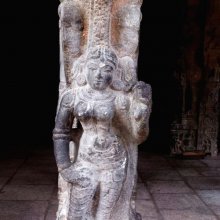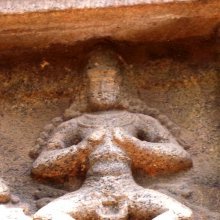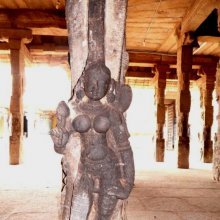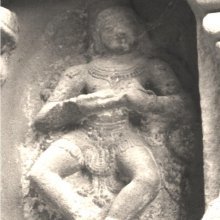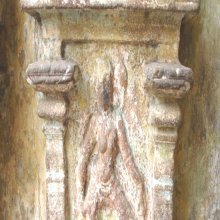Acari, Ācārī, Ācari: 8 definitions
Introduction:
Acari means something in Hinduism, Sanskrit, Marathi, Hindi, Tamil. If you want to know the exact meaning, history, etymology or English translation of this term then check out the descriptions on this page. Add your comment or reference to a book if you want to contribute to this summary article.
Alternative spellings of this word include Achari.
Images (photo gallery)
Languages of India and abroad
Marathi-English dictionary
Source: DDSA: The Molesworth Marathi and English Dictionaryācārī (आचारी).—m A cook,--esp. a Brahman-cook.
Source: DDSA: The Aryabhusan school dictionary, Marathi-Englishācārī (आचारी).—m A cook.
Marathi is an Indo-European language having over 70 million native speakers people in (predominantly) Maharashtra India. Marathi, like many other Indo-Aryan languages, evolved from early forms of Prakrit, which itself is a subset of Sanskrit, one of the most ancient languages of the world.
Sanskrit dictionary
Source: DDSA: The practical Sanskrit-English dictionaryĀcārī (आचारी).—Name of a plant (hilamocikā; Mar. cākavata).
Source: Cologne Digital Sanskrit Dictionaries: Monier-Williams Sanskrit-English DictionaryĀcārī (आचारी):—[=ā-cārī] [from ā-cāra > ā-car] f. the plant Hingtsha Repens, [cf. Lexicographers, esp. such as amarasiṃha, halāyudha, hemacandra, etc.]
[Sanskrit to German]
Sanskrit, also spelled संस्कृतम् (saṃskṛtam), is an ancient language of India commonly seen as the grandmother of the Indo-European language family (even English!). Closely allied with Prakrit and Pali, Sanskrit is more exhaustive in both grammar and terms and has the most extensive collection of literature in the world, greatly surpassing its sister-languages Greek and Latin.
Hindi dictionary
Source: DDSA: A practical Hindi-English dictionaryAcārī (अचारी) [Also spelled achari]:—(nf) typical pickles prepared from mango parings.
...
Kannada-English dictionary
Source: Alar: Kannada-English corpusĀcāri (ಆಚಾರಿ):—
1) [noun] a man with good behaviour; a well conducted person.
2) [noun] a worker in a skilled trade; an artisan such as blacksmith, goldsmith, carpenter, etc.
3) [noun] one of the backward communities notified by the Indian Government.
Kannada is a Dravidian language (as opposed to the Indo-European language family) mainly spoken in the southwestern region of India.
Tamil dictionary
Source: DDSA: University of Madras: Tamil LexiconĀcari (ஆசரி) [ācarittal] 11 v.transitive < ā-car.
1. To practise, follow habitually; அனுஷ்டித்தல். ஆச ரித்த ஆசாரம் [anushdithal. asa ritha asaram] (உபதேசாத்தினமாலை [upathesathinamalai] 67).
2. To observe, keep holy, solemnise, practise as a rite; கைக்கொள் ளுதல். ஆசரிக்குங் கண்டியும் [kaikkol luthal. asarikkung kandiyum] (சைவசமய நெறி ஆசா. [saivasamaya neri asa.] 45).
--- OR ---
Ācari (ஆசரி) [ācarittal] 11 transitive verb < ā-śraya. To worship; வழிபடுதல். தானாசரித்துவரு தெய்வமிது [vazhipaduthal. thanasarithuvaru theyvamithu] (குமரே: சத. [kumare: satha.] 60).
--- OR ---
Ācāri (ஆசாரி) noun < ā-cārya. [Telugu: K. Travancore usage ācāri.]
1. A title adopted by Mādhva and Śrī Vaiṣṇava Brāhmans; மாத்துவ ?வைஷ்ண வப்பிராமணர் பட்டப்பெயர். [mathuva ?vaishna vappiramanar pattappeyar.]
2. [Malayalam: āśāri.] Title of the five artisan castes; கம்மாளர்பட்டப்பெயர். [kammalarpattappeyar.]
Tamil is an ancient language of India from the Dravidian family spoken by roughly 250 million people mainly in southern India and Sri Lanka.
See also (Relevant definitions)
Starts with (+13): Acaria, Acariga, Acarika, Acarimaka, Acarin, Acarin Sutta, Acaripanakya, Acarippuli, Acariran, Acariri, Acarishyat, Acarisu, Acarita, Acaritatva, Acaritavya, Acariya, Acariyabhariya, Acariyadhana, Acariyaka, Acariyakula.
Ends with (+128): Acaracarin, Adhammacari, Adharmacari, Ajivabrahmacari, Ajjhacari, Akasacari, Akashacari, Aksharacari, Alapacari, Alaphacari, Ambacari, Amshakalika-karmacari, Anacari, Antaracarin, Anutiracari, Apacari, Aracari, Asaracari, Atidhonacari, Atyacari.
Full-text (+10): Achari, Kattacari, Acarippuli, Cirpacari, Pautikatitcai, Catikaratitcai, Niratikaratikkai, Vacikatitcai, Naittikatitcai, Cakshushatikshai, Perumpan, Unugu, Pirerakacariyan, Gundan, Sarvasiddhi, Paricatitcai, Asari, Acarin, Manacatitcai, Auttirititcai.
Relevant text
Search found 9 books and stories containing Acari, A-cari, Ā-cārī, Aasaari, Aasari, Ācārī, Acārī, Ācāri, Ācari, Achari, Asari; (plurals include: Acaris, caris, cārīs, Aasaaris, Aasaris, Ācārīs, Acārīs, Ācāris, Ācaris, Acharis, Asaris). You can also click to the full overview containing English textual excerpts. Below are direct links for the most relevant articles:
Token of Remembrance < [July – September 1975]
Book Reviews < [October – December, 2003]
Book Reviews < [July – September, 1993]
Chaitanya Bhagavata (by Bhumipati Dāsa)
Verse 1.9.129 < [Chapter 9 - Nityānanda’s Childhood Pastimes and Travels to Holy Places]
Verse 2.13.251 < [Chapter 13 - The Deliverance of Jagāi and Mādhāi]
Later Chola Temples (by S. R. Balasubrahmanyam)
Temples in Narttamalai < [Chapter XVI - Temples of Rajendra III’s Time]
Temples in Sugatur < [Chapter IV - Temples of Vikrama Chola’s Time]
Temples in Edayarpakkam < [Chapter II - Temples of Kulottunga I’s Time]
Myths and Legends of Babylonia and Assyria (by Lewis Spence)
The Great Chronicle of Buddhas (by Ven. Mingun Sayadaw)
Shri Gaudiya Kanthahara (by Srila Bhaktisiddhanta Sarasvati)
